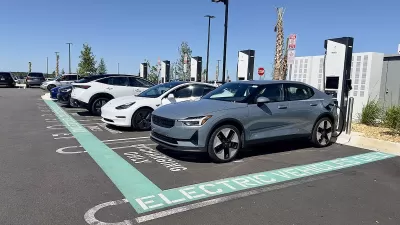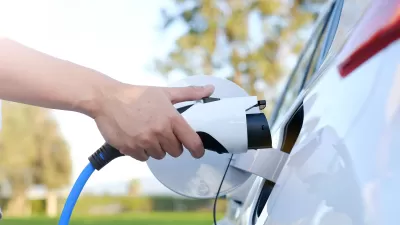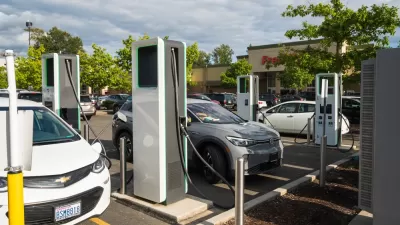The Highway Trust Fund, the nation's source of road and bridge funding, went bankrupt in 2008 and has since relied on transfers from the General Fund to supplement fuel taxes. Republican Senators have proposed a new funding source: an EV fee.

“Sponsored by Sen. Deb Fischer (R-Neb.), the Stop EV Freeloading Act is meant to guarantee that electric vehicles support the federal Highway Trust Fund,” reports Transport Topics, a trucking and logistics online publication. “Currently, electric vehicles, or EVs, do not contribute to the fund, which is an account backed by revenue from federal taxes on gas and diesel fuel.”
Per background the senators provided, the bill would require EVs to contribute to the fund through a fee system. This would include a one-time fee of $1,000 on EVs at the point of sale.
“If the Biden administration plans to continue pushing EVs on the American people, the least Congress can do is require EVs to support the upkeep of our nation’s infrastructure,” Fischer, a member of the Commerce Committee on freight policy, said Sept. 25.
The bill, S. 2882, co-sponsored by Sens. Pete Ricketts (Neb.); John Cornyn (Tex.), and Cynthia M. Lummis (Wyo.), all Republicans, includes an exception for plug-in hybrid electric vehicles, such as the Toyota Prius Prime.
“The Highway Trust Fund [HTF] is used to pay for repairs and maintenance on federal highways and right now EVs are contributing to wear and tear on these roads without contributing to this important upkeep,” Lummis said...
In fact, that ‘EV contribution’ may be disproportionate, according to Fischer's press release dated Sep 25 2023:
The average EV is significantly heavier than its gas-powered counterpart because of the weight of large EV batteries. This legislation would require additional investment in the HTF from heavy EVs that can damage the road and increase maintenance costs.
A comparison of one EV to its internal combustion counterpart found that the difference can be 30% to 63% heavier.
“Every car that drives on our federal highways is responsible for paying into the Highway Trust Fund, and electric vehicles should be no exception,” Cornyn emphasized. “This legislation would ensure EVs pay their fair share and can’t cheat the system.”
Status of the Highway Trust Fund
As noted above, the Highway Trust Fund went bust in 2008, surviving on general fund transfers authorized by Congress and signed by presidents since George W. Bush.
“Rather than raise gas taxes, reduce spending, or identify new financing, lawmakers have relied on nearly $155 billion of general revenue transfers [pdf] to close this gap and keep the trust fund solvent,” states a Feb. 3, 2022 blog post from the Committee for a Responsible Federal Budget, a nonpartisan, non-profit organization.
According to the Congressional Research Service [pdf], “[h]istorically, all of the federal highway program and 80% of the public transportation program have been funded with revenues from the Highway Trust Fund (HTF). Revenues supporting the HTF come from a combination of fuel, truck, and tire taxes, but the fuel taxes provide about 85%-90% of the money.”
The Eno Center for Transportation is an authority on the trust fund's insolvency. See Planetizen posts based on their reports:
- The First Highway Trust Fund Bailout, September 11, 2019
- Ten Years of Highway Trust Fund Insolvency, September 11, 2018
Effect of Infrastructure Investment and Jobs Act
The much heralded Infrastructure Investment and Jobs Act (IIJA), aka Bipartisan Infrastructure Law, continued the bailout, but magnified it significantly.
“In addition to new investments in surface transportation, transit, broadband, energy, water, tax breaks, and other transportation spending, the bipartisan infrastructure law (officially the Infrastructure Investment and Jobs Act) included a five-year reauthorization of surface transportation programs, also known as a Highway Bill,” states the budget organization's blog.
The infrastructure law plugged the trust fund’s near-term gap through a large $118 billion general revenue transfer, delaying insolvency from 2022 to 2027. But rather than narrowing the long-term structural funding gap, increased highway and transit spending levels authorized under the law will widen the gap.
Planetizen coverage of the transportation reauthorization aspect of the IIJA can be tracked under the tag Surface Transportation Reauthorization Act of 2021.
Related in Planetizen on EVs and the Highway Trust Fund:
- It's Time For A National VMT Fee Policy, August 4, 2021 [Note that such a policy is in the Infrastructure Investment and Jobs Act: National Mileage Fee Pilot Program Late to Launch, June 29, 2023]
- Federal Lawmakers Target Electric Vehicles in Transportation Reauthorization, July 15, 2019
Hat tip to AASHTO Daily Transportation Update, Oct. 6, 2023.
FULL STORY: Senators Propose EV Fee for Highway Trust Fund

Planetizen Federal Action Tracker
A weekly monitor of how Trump’s orders and actions are impacting planners and planning in America.

Restaurant Patios Were a Pandemic Win — Why Were They so Hard to Keep?
Social distancing requirements and changes in travel patterns prompted cities to pilot new uses for street and sidewalk space. Then it got complicated.

Map: Where Senate Republicans Want to Sell Your Public Lands
For public land advocates, the Senate Republicans’ proposal to sell millions of acres of public land in the West is “the biggest fight of their careers.”

Maui's Vacation Rental Debate Turns Ugly
Verbal attacks, misinformation campaigns and fistfights plague a high-stakes debate to convert thousands of vacation rentals into long-term housing.

San Francisco Suspends Traffic Calming Amidst Record Deaths
Citing “a challenging fiscal landscape,” the city will cease the program on the heels of 42 traffic deaths, including 24 pedestrians.

California Homeless Arrests, Citations Spike After Ruling
An investigation reveals that anti-homeless actions increased up to 500% after Grants Pass v. Johnson — even in cities claiming no policy change.
Urban Design for Planners 1: Software Tools
This six-course series explores essential urban design concepts using open source software and equips planners with the tools they need to participate fully in the urban design process.
Planning for Universal Design
Learn the tools for implementing Universal Design in planning regulations.
Heyer Gruel & Associates PA
JM Goldson LLC
Custer County Colorado
City of Camden Redevelopment Agency
City of Astoria
Transportation Research & Education Center (TREC) at Portland State University
Camden Redevelopment Agency
City of Claremont
Municipality of Princeton (NJ)





























